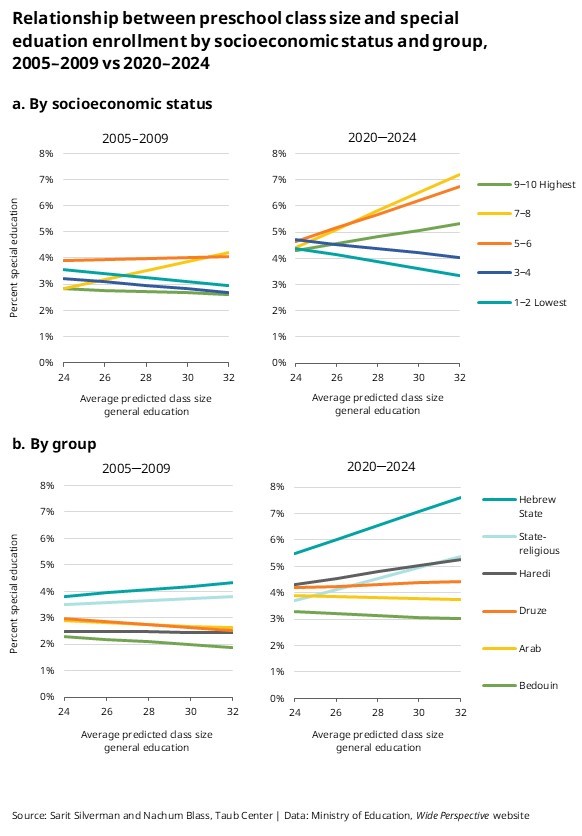This policy paper by the Taub Center shows that overcrowding in general preschools leads parents of children with special needs to enroll them in separate special education frameworks — a phenomenon that occurs mainly in Hebrew State education and in socioeconomically strong local authorities. The study’s authors, Dr. Sarit Silverman and Nachum Blass, the head of the Education Policy Program at the Taub Center, call on policy makers to reduce class sizes in the general preschool education system in order to expand integration opportunities for children with special needs.
The study, which examined the phenomenon between 2005 and 2024, reveals a shift in the relationship between average preschool class size in local authorities and the share of children enrolled in separate special education frameworks, with significant differences between municipalities at different socioeconomic levels and between sectors and supervision types. This trend, which was nearly nonexistent at the beginning of the period under review (2005–2009), has expanded steadily over the past two decades, and is particularly evident in Hebrew State education and in middle- to high-income local authorities. For example, between 2020 and 2024, the share of students enrolled in separate frameworks in Hebrew State education ranged from 5.5% in municipalities with the smallest preschool classes to nearly 8% in those with the largest classes, compared to much lower rates in other sectors and supervisory authorities. In more affluent local authorities (clusters 5–8), enrollment rates reach 4.5%–7%, compared to approximately 3%–4% in less affluent areas.
According to the researchers, the increase in enrollment in separate special education preschools undermines the Ministry of Education’s efforts to increase the share of students with special needs integrated into general preschools. They call on the Ministry to act without delay to reduce the average number of children in general education preschools from 30 today to 19, as recently recommended by the Shapira Committee.

Dr. Sarit Silverman says: “Smaller preschool classes can promote meaningful inclusion, which is an important educational and social goal, while also creating economic efficiency by reducing the need for costly separate frameworks. However, it is important to emphasize that the lower participation rates in separate frameworks observed in weaker local authorities and in Arab and Haredi education may reflect more limited access to separate settings, rather than lower demand. Therefore, alongside expanding inclusion opportunities, it is essential to ensure equitable access to special education services across all population groups.”
Nachum Blass adds: “Reducing class sizes in general education preschools has a dual benefit: it creates higher-quality learning environments for all children and reduces referrals to separate special education frameworks.”
The Taub Center for Social Policy Studies in Israel is an independent, non-partisan socioeconomic research institute. The Center provides decision makers and the public with research and findings on some of the most critical issues facing Israel in the areas of education, health, welfare, labor markets and economic policy in order to impact the decision-making process in Israel and to advance the well-being of all Israelis.
For further details or to arrange an interview, please contact Chen Mashiach, the Center Spokesperson: 054-7602151.
